The 2022 Best Farmers’ competition winners were unveiled on Friday, December 02, at Vision Group head offices in Kampala. The top best farmer received sh50m, the second sh30m, third 20m, while the rest shared sh50m. The competition, which has been running since 2014, was sponsored by the Netherlands embassy in Uganda, KLM Royal Dutch Airlines, dfcu Bank and Koudjis Nutrition BV, writes Joshua Kato and pictures by Mpalanyi Ssentongo.
Col. Dick Bugingo: MY Dutch experience improved milk production
On April 20, 2015, Col. (rtd) Dick Bugingo stood in the middle of a large dairy cattle shelter in the Netherlands and shook his head. The shelter had over 100 cows with robots doing the work.
One of them, a floor waste cleaner, constantly moved back and forth scooping the dung, while another dropped feeds in the troughs. Another was milking, while the last delivered the product.
“I was awed by the ease with which tasks were being carried out at these farms. These and other aspects, such as genetics and breed selection, formed a big part of the things that I vowed to implement when I returned to Uganda,” Bugingo says.
Bugingo was one of the inaugural winners of the Best Farmers’ competition in 2014, who travelled to the Netherlands in 2015 as part of the prize. His AGDI Dairy Farm is located in Kiruhura district, 6km on the Lyantonde-Kiruhura road.
Today, he has at least 100 dairy cattle, a dairy farmers training centre, feed storage facilities and a farmhouse.
Starting off AGDI
(Agnes and Dick) was established in 2010 by Bugingo and his wife Agnes.
“I began contemplating farming when my retirement from the army became eminent. Having worked in the army for 23 years, I had two options for retirement — look for a job or become self-employed,” he says.
“In deciding to work for myself, I had two options: Stay in the urban centre and sell airtime or return to the village and explore the immense untapped opportunities. I chose the latter and use my land to make money,” he says.
He started by looking after Ankole cattle.
“I soon realised that having a herd of 600 cattle was not as prestigious as I was made to think. The cows were not as productive as anticipated, yet I was employing a significant number of workers to look after them,” he says.
He, therefore, decided to venture into beef farming with Boran bulls.
“I sold all the 600 Ankole cattle that I had and bought 300 Boran bulls for beef. Beef farming soon lost its glitter and I was faced with the reality that I had taken on a project that demands more resources than I had,” Bugingo says.
He needed more land, which he did not have. That was the turning point for him.
“It also taught me one of the many lessons that I have learnt about business. As an entrepreneur, you have to be able to make tough decisions and stick with them,” he says.
Turning point
In 2010, Bugingo procured the services of a professional business analyst, Dr Florence Kasirye, who helped him develop a five-year business plan for commercial dairy farming.
“In one month, I sold all the 300 Boran bulls and bought 150 Friesian cows, which I personally selected. That is when AGDI Dairy Farm was born and I have never looked back,” he says.
“Within a period of five months, I was getting 400 litres of milk per day. That was productivity. I sold 50 cows and remained with 100,” he says.
The decision was taken on account of the limited land and pastures to handle all the 150 cattle.
“This taught me my second lesson about business: Profit is not in quantity but in quality. Our local cows are bad for business because they are not productive and without productivity, you cannot make a profi t,” he says.
This formula was also proved true when Bugingo visited the Netherlands.
“Those people want quality over quantity. You can have a small herd of cattle, feed them well and achieve the same or even more yields than when you have a large one,” he says.
Bugingo won sh7m in 2014 and he used the money to improve his water distribution system.
“One of the reasons why I won was because I worked hard to change the face of my farm when I came back from the Netherlands. I made it a place not just for me, but for the community. I improved my cattle genetics to those that produced more milk and constructed a training centre for farmers,” he says.
Johnson Basangwa turns poultry farm into East Africa’s egg basket
While touring modern farms in the Netherlands six years ago, Johnson Basangwa, 45, was inspired by the way the Dutch operate their farm busines.
The 2015 Vision Group’s Best Farmer admired the poultry enterprises where a single farm produces over 15,000 trays of eggs per day.
He saw farms accommodating between 200,000 and 250,000 birds! The Dutch farms were a spectacle to behold. The retired roads constructor also found out that unlike in Uganda, where farmers undertake more than four enterprises, the Dutch specialise in one enterprise.
Being a practicing poultry farmer with 5,000 birds at Jeka Poultry Farm in Kamuli district, he got inspired.
Automated feeders, drinkers
“I decided to copy what I could when I returned home,” he says.
Basangwa admired the modern technologies where feeding of birds is automated. He also observed that the technologies ease tasks, reduce labour costs and risks involved in using local farming methods. He was awed seeing heavy trucks leaving a single farm loaded with eggs destined for local and international markets.
Unlike at Jeka Farm, where feeds and concentrates were mixed using spades, the Dutch use mechanised feed mixers to ensure quality.
He wished to have such technology at his farm in Bukwenge zone, Kamuli Municipality, Kamuli district.
On-farm training institute
Basangwa also admired the Dutch’s generosity of sharing knowledge with others. Agricultural institutes were established on the farms to skill the youth.
The institutes broadened Basangwa’s earlier dream of setting up a similar project to empower the youth, upcoming and practicing farmers in Busoga region. He also learnt that to ensure quantitative and qualitative production, the farm should have professionals in the production and accounting departments, alongside a committed work force.
The workers undertake surveillance in production, apply feeds and water to the feeders and drinkers, while others collect eggs from the nests and supervise the shelters to ensure that the birds are in good health.
Julius Bigabwa went for agri-tourism
F our years after Julius Bigabwa visited farms in the Netherlands, his farm has grown from nine to 30 acres, with 13 enterprises and value-addition. The farm, located at Kanyambeho village in Kabarole district, 7km along Fort Portal-Kamwenge road, has been around for 16 years.
It is managed by Julius Bigabwa and Gladys Natugonza Mirembe (BIGLAD). Bigabwa was second overall winner of the 2017 competition.
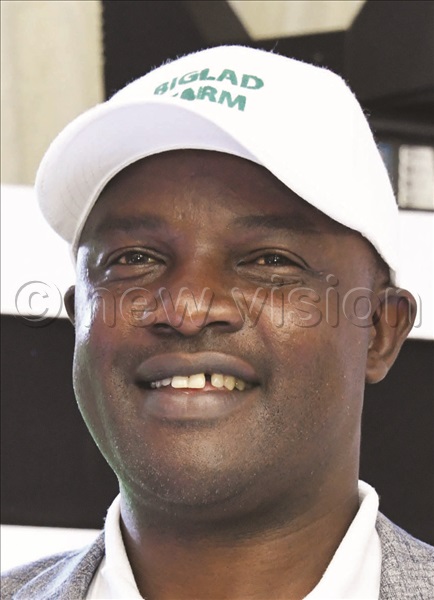
He visited the Netherlands in 2018.
“I won because when I returned from the Netherlands, I decided to remodel my farm into agri-tourism. I made sure that whoever comes to the farm does not leave the same. It is a new practice in Uganda that farmers are still picking up. People visit a farm not just to walk around but to learn,” he says.
Upon return from the Netherlands, Bigabwa invited the Programma Uitzending Managers (PUM Experts) from the Netherlands to come and give his advice on agri-tourism.
PUM is a non-profit organisation which has been advising businesses in developing countries and emerging markets for 35 years. It links businesses to Dutch professionals, who voluntarily share their experience with local farmers to create a better world.
“Resoort stayed with us for one month in 2019, but what we learnt from her became a roadmap for our success to-date. After her visit, everything became easy for the farm.
“We changed the layout of the farm, improved infrastructure by constructing a better livestock house and a parking area. Flowers were also planted to attract birds and butterflies,” he says.
The farm started to host many visitors from within and outside the country. American students from Roanoke College in Virginia, USA were the first to come from far.
These were interested in organic farming methods, such as agroforestry, tree nursery establishment, sustainable organic horticulture, wetland management, soil and water conservation, livestock and poultry management, botany and ecology, climate change and variability.
Setting up structures
Construction of structures started in 2018 with a training centre – BIGLAD Organic Training Centre in Kanyambeho, Fort Portal.
“Trainings are conducted every Saturday by experienced farmers. This has helped not only us, but also other farmers in the region,” he says.
The farm also completed accommodation for visitors at the farm. Foreigners pay $100, while Ugandans pay sh100,000 to sh180,000. Other expenses included providing Wi-Fi internet, installing CCTV cameras everywhere and recruiting security personnel, manager, cooks, and cleaners, among others.
“This centre was partly funded by Hans Blankert Foundation in the Netherlands. We were helped by Resoort on how to apply for the grant. The foundation gave us a subsidy of 5,040 Euros (sh20m),” he says.
“In 2017, we used to host less than 200 visitors per month, but now we get an average of 1,000 visitors per month, who come for touring, consulting, training, marketing and farm management.
“The concept of agri-tourism is still new to many of us, but we endeavoured to move on with our dream and now we have started to get benefits after 10 years. Tourism attractions are dynamic, we keep updating, and advertising on new innovations of farming,” he says.
Bigabwa says as more people migrate to cities, they become urbanised and they do not know where even a mango they buy in supermarkets comes from, but at BIGLAD, one can be able to see that.
Dr Emma Naluyima focuses on young people to grow agriculture
A breathtaking scenery welcomes you to Mathematics, Science and Technology (MST) Junior School.
The walkways are decorated with strawberries and tomatoes planted in recycled plastic bottles that create a beautiful scenery. This school is part of Dr Emma Naluyima’s developments since winning the Best Farmers’ competition in 2014.
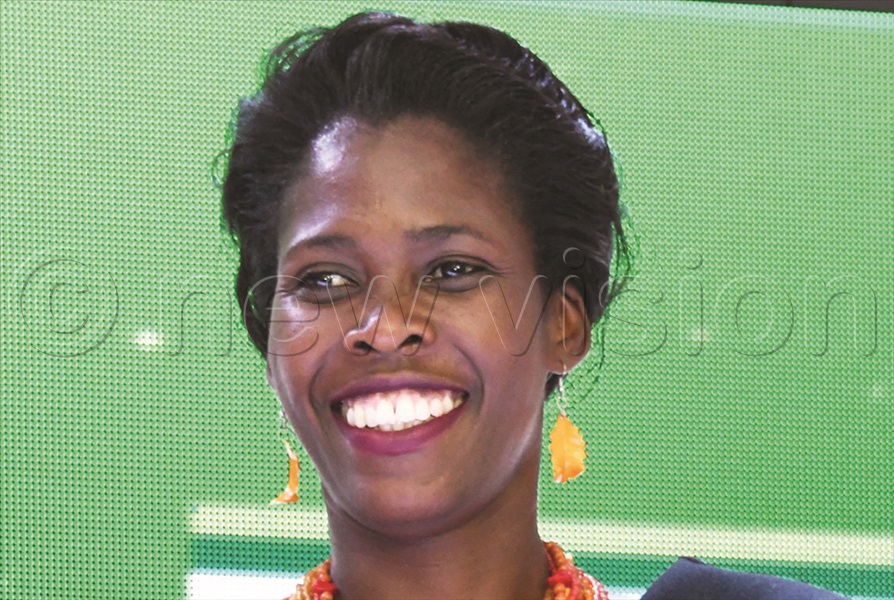
Dr Naluyima aka Maama Pig, travelled to the Netherlands in 2015 and this opened her eyes to more subtleties in farming. In 2014, she had 30 sows, 10,000 catfish, a quarter of an acre of bananas plus vegetables.
“What made me the winner was the way I used my small plot to earn big, even more than those with large acreages,” she adds.
Dr Naluyima used the prize money to fence off the farm, which helped to strengthen the biosecurity for her farm. Currently, she has a piggery unit with a slaughter and packaging unit, a dairy unit with 10 cows, aquaculture, poultry, vermiculture, maggot farming and hydroponics.
MST Junior School
MST Junior school is located infront of Dr Naluyima’s farm at Bwerenga village in Wakiso district. The school has a second branch in Hoima city, western Uganda.
“During the visit to the Netherlands, I met students who were placed at different farms and companies to get hands-on training about the latest technologies and best agronomical practices, which produces the best extension experts and technical farmers,” she explains.
On her return, Dr Naluyima discussed with her husband, Washington Mugerwa, what the farm can offer to the farming sector in the aspect of producing technical extension providers, as well as experienced and agriculture loving practitioners at all levels.
They resolved to start a primary school, running from nursery to P7, based on maths because everything depends on numbers and science as these are key in best production and productivity, while technology is essential for ensuring quality.
“Training children to embrace agriculture at an early age was the game changer for me. MST school, our school is a unique model in Uganda’s education system and I think it is one of the reasons that I won,” she says.
Dr Naluyima explains: “In addition to the normal national school curriculum, our pupils are trained on the best and modern farming agronomic practices based on three aspects that all Africans should have to develop our countries. These are; time-keeping, value for money and the culture of saving.’’
“All our pupils have bank accounts on which they save their money from their sales as they are taken to the banks on weekends. Here, we train them the value of saving and by the time they leave the school, they have some money as capital,” she says.
Inid Nafula, the agriculture in-charge teacher at MST, says farming does not stop with pupils, but teachers, too, are equipped, encouraged and helped to have gardens from which they get food for their homes.
My farming breakthrough
Dr Naluyima recalls to have started farming in 2006 with four gilts and one boar.
At the time, she was working with the National Animal Genetic Resources Centre and Data Bank (NAGRIC & BD), where she realised piggery was a profitable business and decided to take on the enterprise as a business in Bwerenga.
“By the time I established the farm at Bwerenga, I had 10 sows, from which I got money for my master’s degree as we used to pay sh2m per semester at the university. This gave me more courage to fully go into piggery,” she says.
Dr Naluyima says one of the key components for a successful piggery farm is genetics and at the time there was no good genetics in Uganda, so she decided to import a Camborough boar from South Africa at sh10m in 2010.
“This was my breakthrough because my farm became the source of good breeds for every farmer who wanted to make profits from piggery. The Camborough breed is good because it has little fat, which makes it good for pork, it is also fast-growing and has good mothering ability,” she explains.
Importing chicks from the Netherlands
To add value to the poultry project, Basangwa, in 2018, started importing day-old chicks from the Netherlands. Using online marketing, the chicks are airlifted to Entebbe, before ushering them to the brooders at JEKA Farm.
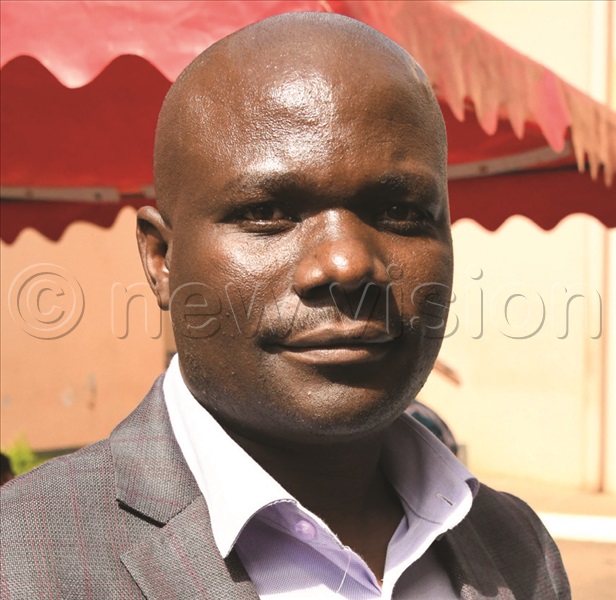
Basangwa says the venture is aimed at ensuring quality birds for eggs production and longevity.
“The Dutch chicks are manageable and carry value for money,” he said, adding that they are also sold on orders to interested farmers across the country.
The production manager, Veronica Namukose, said the imported chicks have high egg productivity and are resistant to diseases.
For farmers who have less experience in handling the chicks, he keeps them for four weeks before they are taken. Importation of chicks depends on the placed orders; however, records indicate that over 20,000 chicks are received every four months.
The chicks’ brooder has a conducive environment, featuring ventilated shelters, clean feeders and drinkers and hanging thermometers that measure temperature. With each brooder holding 10,000 chicks, hygiene and appropriate feeding is highly observed to have quality mature birds.
“I won again because I refocused my farm practices, innovated to increase farm efficiency, raised poultry numbers by over 100% and widened the market reach for my products,” Basangwa says.
Tonny Kidega adds value and improves dairy cattle breeding
Located in the outskirts of Gulu City, it is one of the best managed dairy farms in the country. The cattle graze in modern shelters made using stainless bars.
The farm is largely mechanised with several multipurpose tractors parked under a shed near the cattle house. Silage bunkers are also visibly full of feeds. Not far from the main house, a distribution van is moving out, taking packed milk and yoghurt to customers in Gulu town. The farm is owned by Dr Tonny Kidega, a 37-year-old veterinary officer.
Kidega was the overall winner of the 2015 Vision Group Best Farmers’ competition.
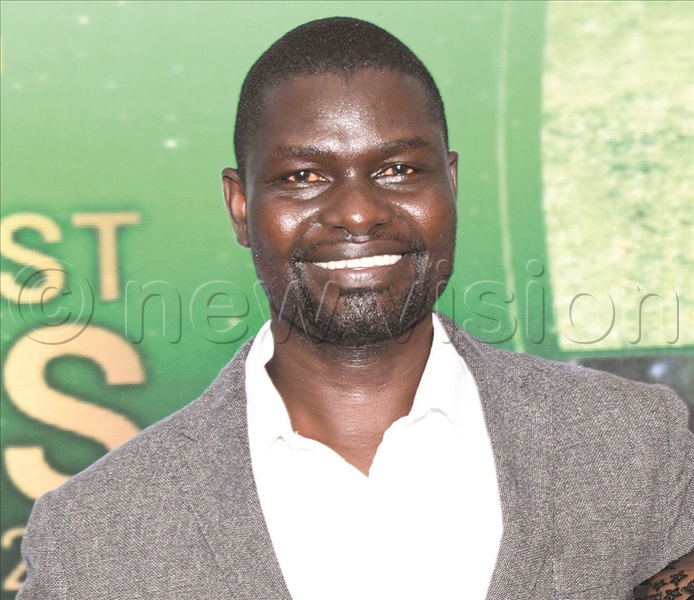
“I won because my veterinary practices have moved away from my locality in Gulu to the rest of the country and all over the world. I am championing the revolutionization of dairy cattle genetics in Africa,” he says.
Kidega, who is the director of Gulu Country Dairy Farm (GCDF), established a mini dairy processing plant, worth about sh220m, after returning from a learning tour of the Netherlands in 2016. Kidega quit his job as a veterinary conservation coordinator at Budongo Forest to start his farm in 2010.
“I had saved some money, so I bought four heifers from a farm in western Uganda,” he says.
At the beginning, he was fortunate to get a sponsored training in dairy farming in the US. When he returned, he put all his efforts in improving genetics and breeding on his farm.
He constructed metallic cattle shades using second-hand equipment that he sourced from the US. Through improved breeding, by 2014, he had a good herd, with some cows yielding as much as 18-20 litres a day.
Trip to the Netherlands
“I went to the Netherlands with an open mind. I wanted to see and learn and, indeed, when I came back, I implemented what I saw,” he says.
Kidega realised that dairy farmers in the Netherlands add value to their products and earn higher returns.
“They told us that there were over 100 products from milk. The easiest of these was, of course, processing and packing the milk, rather than selling it raw, plus processing yoghurt, ghee and cheese. I have introduced several dairy technologies on the farm. I have a yoghurt and ice cream processing system,” Kidega’s products include pasteurised milk, ice cream and yoghurt.
“Our ice cream sells more than yoghurt. In fact, we are now changing our business model to encompass mobile ice cream sales and sale of ice cream mix to several outlets in Gulu City,” he says.
Currently, Kidega is working with Yoo Leng Ice Cream as one of his partners in Gulu to serve the people there. “We are working on opening many ice cream outlets in Gulu city and beyond with our new model,” he says.
Teddy Wabomba Wanzunula: The Dutch tour helped me resize the labour force and diversify
Teddy Wabomba Wanzunula is an electrical installation graduate of Elgon Technical School. However, in June 2017, when she visited the Netherlands, she did not go there to purchase electrical equipment, but rather as a farmer.
“I was using rudimentary farming methods. Upon winning the Best Farmers’ competition in 2016 as the first runner-up, I was able to meet and interact with farmers nationally and internationally, who helped me improve my practices,” she says.
When Wanzunula returned from the Netherlands, she started putting into practice the lessons learnt.
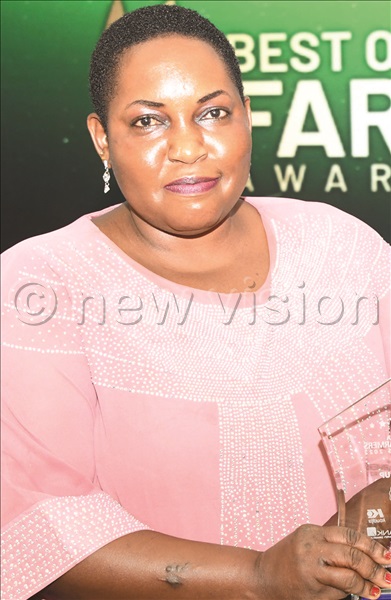
“I taught farm management, value-addition, the use of water for irrigation and agri-tourism,” she says.
Wanzunula, popularly known as Bego, the farm brand name, started with a poultry unit at her residential home in Senior Quarters Soroti City.
The zeal to farm as a business motivated her to acquire five acres in Okidoi village, Ocokican sub-county, Soroti district.
She started farming as a business 13 years ago. Before the trip, the major enterprises were poultry, passion fruit and pumpkin growing, horticulture and beekeeping, all at a small, urban-like scale. Upon returning, she prioritised enterprise selection and settled for piggery with 300 pigs, seven fish ponds, two acres of passion fruits, over 40 beehives, pineapple and poultry.
The pig categories at the Bego Farm are: 40 sows, 20 boars, 50 gilts, 60 weaners and 140 piglets. She also introduced fish farming.
Agro-tourism centre
Wanzunula learnt that in the Netherlands, farms are also used as tourism centres, where people pay to visit and learn.
“I learnt farm organisation and management in the Netherlands and I applied them on my farm when I returned. We have a clean, hygienic farm. Our products are clean and the farm lay out is clear,” she says.
Wanzunula has since turned the farm into a centre of attraction to all classes of people, with the extension of Bego Demonstration Farm sitting on five acres. The centre was established in 2018, after she returned from the Netherlands, using proceeds from the piggery project.
Bego Demonstration Farm accommodates seven fishponds, piggery units with about 300 pigs, passion fruits, pineapple and vegetable gardens, beehives, a store, an office and hostel facilities for intern students.
The demonstration farm is a knowledge transfer centre with a training hall equipped with a solar pump, providing running water and light to the farm. Society impact Wanzunula gives back to her neighbours and society through several ways, including employment.
The Bego 1 and Bego 2 farms have four permanent employees. Casual labourers are sourced to support when there is a lot of work, especially during harvesting.
“These people earn a living and also acquire knowledge, which they take back to their homes,” she says.
Interns, for example, from Busitema University, Arapai Campus regularly visit to learn. The hostel facilities accommodate between 50-60 students. Individual farmers, NGO-supported farmers’ groups, community integrated development initiatives, as well as schools and universities, have accessed services from this farm. She has hosted a number of farming trainings on her farm to share knowledge and inspire farmers to embrace farming as a business.
“We have held trainings here, in collaboration with several groups, including the Embassy of Netherlands, Vision Group and several others that I organised as an individual,” she says.
Godfrey Musanje diversifies growing oil palm with coffee and dairy cattle
Godfrey Musanje received an early morning telephone call while working on his farm in Kalangala district.
“Musanje how are you,” the caller said. “Fine and you? But let me first park the car before we can talk,” he said.
“What has changed in your life ever since you became a best farmer in 2015?” the caller asked.
“This is one of the changes….,” “Which change?” the caller asked.
“I own a vehicle that I use to transport my harvests,” he answered.
Buying a car may not be a big deal for some people, but for Musanje, it is a testimony of how far he has come.
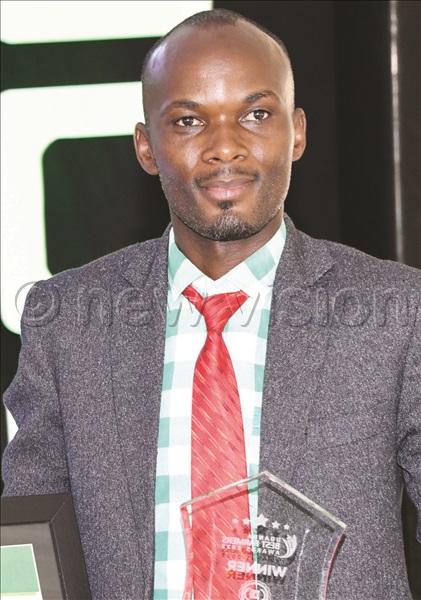
He does not only have a personal car, he also owns a truck to meet his farm’s transport needs. His oil palm acreage has increased from 40 to 48 acres.
He has also diversified into coffee with five acres, a coffee nursery bed and dairy cattle.
In 2015, Musanje was nominated for the Best Farmers’ competition and he emerged as one of the winners. He travelled to the Netherlands in 2016.
“Winning in the competition and the subsequent trip to the Netherlands opened my eyes to many opportunities. When I came back to Uganda, many people thought I had been given a lot of money and so I had to work harder in order not to embarrass myself, the people who look up to me and the sponsors,” he says.
Musanje explains that he may not have replicated everything he learnt from the Netherlands, but he picked major lessons.
Background
Musanje dropped out of school in Senior Two. He worked to find his own employment and now his farm is a beehive of activity.
In 2001, Musanje, upon completion of his Senior Two at Naluzane Secondary School in Masaka district, decided to enrol for an agricultural course, specialising in crop husbandry at St Urusula Farm School in Masaka. He was a teenager.
“I had to take farming seriously,” he says, as he moves about his oil palm plantation in Kizira unit, Kayunga sub-county, Kalangala district.
Musanje says he was encouraged to join the oil palm project in 2005 by the district agricultural officer, David Balironda, together with his team, which included Nelson Basaalidde, now the manager of Kalangala Oil Palm Growers’ Trust.
The team moved around the district explaining to farmers to get organised to benefit from a ‘new project’ that was about to be launched in their area.
“I decided to attend the training because I had realised that cutting down trees for timber was not sustainable,” says Musanje.
He had been engaged in the timber business in 2005- 2007.
“We gradually switched from timber to oil palm because it was a new crop, which we embraced cautiously in the initial stages,” he explains.
Musanje noted that together with his elder brother, Jackson Kisolo, 40, they owned 15 acres and it was this land that they cleared to plant oil palm.
“The land was in bibanja but we have since processed the title deeds using proceeds from the sale of harvested fresh fruits,” he explained.
From 15 acres of land that they started with, today, Musanje and his brother own 48 acres, all covered with mature oil palm trees. This is up from 40 acres six years ago.
“My farm grew from about 15 to 48 acres, I introduced other enterprises like coffee and dairy. I think this gave me an edge over others,” he says.
Because of his hardwork, according to the project managers, Musanje ranks high among the most successful farmers, who are ever willing to learn how to improve on the project’s implementation.
Clara Anzoa spreading the gospel of piggery in West Nile
Flying to Europe was a dream she thought would remain just that! But in June 2017, Clara Anzoa Aya flew to the Netherlands after she was among the best farmers in the 2016 competition.
The 43-year-old from Cele celea west village in Moyo town council is the owner of Aya Mixed Farm. She mainly practices piggery and poultry, a business that she has done for 10 years.
“The Netherlands was an amazing country in all aspects. Their farms are very organised, with a lot of machinery,” she says.
However, what caught her eye was the level of value-addition on farm products. “I vowed to start adding value to my products because that brings in more money,” she says.
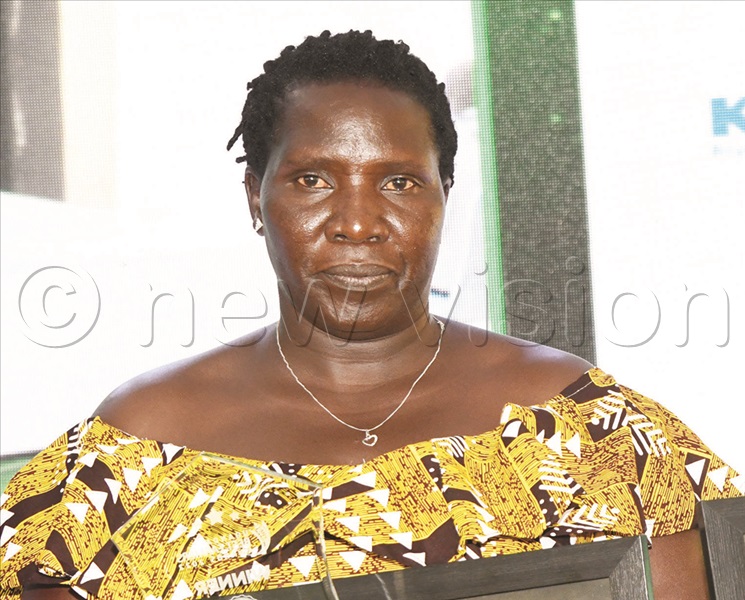
Therefore, when she came back, rather than sell live pigs, she started slaughtering them.
“I set up a restaurant where I sell roasted pork. My earnings per kilogramme rose from sh5,000 to sh20,000,” she says.
At the same restaurant, she also sells ‘dressed’ or roasted chicken from her farm.
“I created my own market for my products in West Nile. I set up a pork restaurant in Moyo town and remodelled my farm to improve quality and quantity of produce,” Anzoa says.
Pig enterprises When Anzoa won in 2016, she had three breeds of pigs. These included Comborough, Large white and Landrace. In total, she had 63 mature pigs _ 60 sows and three boars.
“It is basically these pigs that won me the trip to the Netherlands,” she says.
However, the COVID-19 pandemic forced Anzoa to scale down. Currently, she has 47 breeding sows with the ability to produce at least 800 piglets annually.
However, she says these are better managed and yield more per sow than before, thanks to the pigs feeding and management lessons that she got from the Netherlands.
“When I came back, I sourced for better Landrace breeds from fellow best farmer Aloysious Lubega of Bulamu Farm in Wakiso from whom I bought 23 mature sows in 2019,” she says.
Okodia boosts beekeeping in North and Eastern Uganda
Robert Okodia nervously ate his breakfast in The Hague on the morning of June 5, 2016. On this day, he was to travel alone to meet officials of a possible business partner, Wood en Daad.
This is a Dutch organisation whose objective is to fight poverty through collaborating with community organisations, such as farmers’ groups across the world.
“This was a make or break day for me. If the deal went through, my beekeeping business was going to change for the better. If the deal failed, that would be a big disappointment,” he remembers.
Okodia, the chief executive officer of Aryodi Bee Farm, was among the best farmers in the 2015 Best Farmers’ competition, organised by Vision Group with support from the Royal Netherlands Embassy, dfcu bank, KLM Airlines and Koudjis Nutrition BV. As usual, the winners shared sh150m and had a fully paid study tour of the Netherlands.
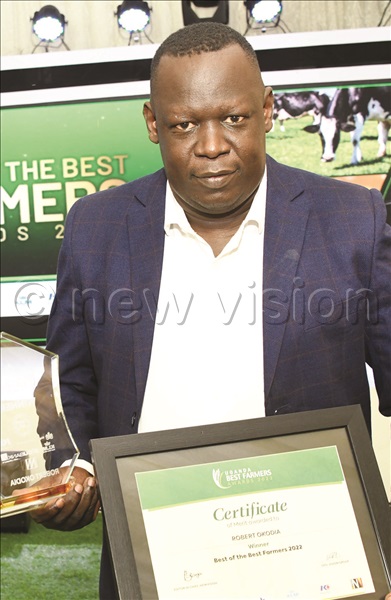
“When I met representatives of Wood en Daad, they agreed to work with us to develop our enterprise and the community,” Okodia said.
One of the conditions was that Okodia works more with the local youth and women population in order to produce more honey and at the same time fight poverty among the population. The partnership involved at least $30,000.
“This was a big leap, given the way I started my small farm, thanks to the Best Farmers’ competition,” he says. Through subsequent networking, Okodia linked up with honey product buyers in Europe and Japan.
“I got new markets in Asia and Europe for my bee products. I think this impressed the judges because many farmers are struggling to get consistent markets for their products,” Okodia says.
Hard start
Aryodi Bee Farm, located in Lira district, started on a low note in 2014, with a number of challenges, for example, low capital and little progress being realised.
However, its growth increased after Okodia scooped an award as one of the best farmers in the country.
The farm’s beekeeping and honey production business expanded and later gave birth to Wimrob Bee Company in 2016, which handles honey processing, beeswax exports and manufacturing of beehives.
When Okodia came back to Uganda a week later in June 2016, the journey to boost and expand beekeeping in the north and east started.
Okodia started with 20 farmers in Lira, then rolled out to Apac, Kole, Oyam, Otuke and Amolatar districts.
He also expanded to Lamwo, Kitgum, Nwoya, Pader, Nwoya and Nakapiririt with help from partners. The company preached the gospel of beekeeping as a business and also established 20 honey collection centres in Lango, Acholi, West Nile, Teso and Karamoja sub-regions.
“We have 5,082 outgrowers, 20 collection centres and we are soon opening branches in Masindi and Kiryandongo districts,” he says.
Honey processing Okodia says Wimrob Bees Company Limited is the business arm of the farm. The business is registered with headquarters and a factory in Lira, northern Uganda.
It has honey hubs and collection centres in West Nile, Acholi, Lango, Teso and Karamoja. Wimrob processes and sells Uganda National Bureau of Standards (UNBS) Q-level certified honey with brand names of African Queen Honey and Lango Premium Honey.
Currently, Wimrob supplies about 30,000kgs of quality honey, 5,000kgs of beeswax, 1,000kgs of crude propolis and about 200g of bee venom powder. Combed honey and processed honey are mainly for sale within Uganda and East Africa (Rwanda and Kenya), but this year, they have orders to export to the Netherlands, Japan, Germany and China. Beeswax is mainly for export to Japan.
Sowedi Malenya builds state of the art poultry house
When Sowedi Malenya, 43, travelled to the Netherlands seven years ago, his focus was on getting rich and getting knowledge on poultry farming. Malenya confesses that his trip was a turning point for his farming enterprise.
The resident of Solo cell in Busia Municipality, Busia district, also does paddy rice growing and processing (value-addition).
He also practices a string of other farming enterprises, which include maize flour processing and has coffee mills. He emerged the best farmer in eastern region in 2015.
“In the Netherlands, the scale of poultry enterprise was amazing. However, what was humbling in all this was the uniqueness of poultry furniture, laid in regular and perfect order,” recalls Malenya.
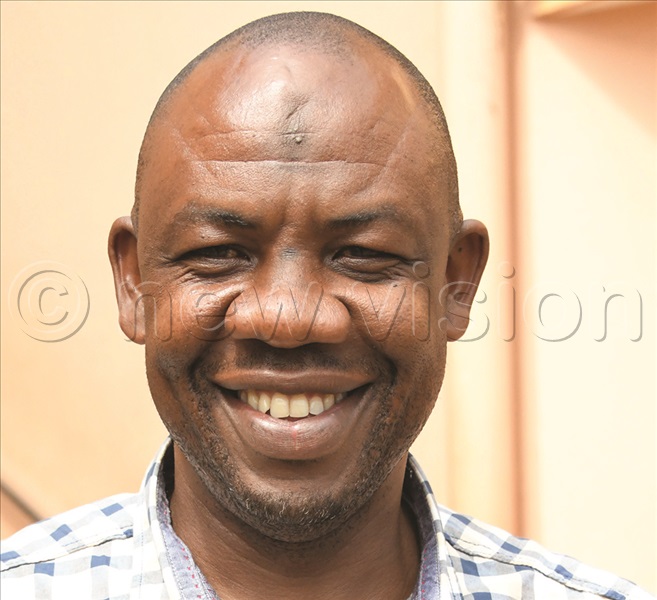
His immediate action plan when he returned from the trip was to overhaul his poultry farm with “a sh800m master plan.”
“The funds that would facilitate the master plan were cumulative savings from a string of my businesses over time,” observes Malenya.
Master plan
The master plan entailed the purchase of 10 acres of prime land in Busia Municipality, where he constructed a modern poultry house in 2017. The architectural design was based on his experience in Netherlands.
“Each of the new poultry houses is expansive, with a high roof capable of providing sufficient supply of fresh air to the birds. The interior of the four poultry houses I have since constructed are adequately furnished with drinkers, as well as modern and identical feeding troughs,” stresses Malenya.
Today, Malenya’s poultry enterprise has grown by more than 10-fold, from a stock of 8,000 seven years ago, to 120,000 today.
“I thought so much about keeping layers or kuroilers, I realized that kuroilers are better in the long run. This application of agronomics to earn more impressed the judges and this is why I won,” he says.
In addition to expansion in terms of scale, Malenya has since acquired a hatchery with a production capacity 80,000 chicks per cycle.





